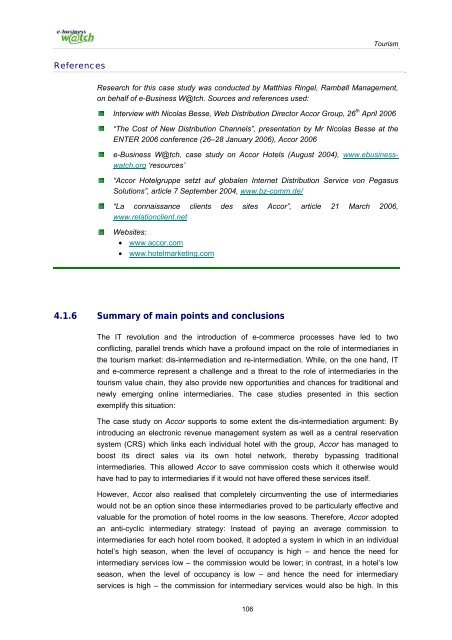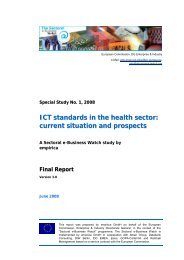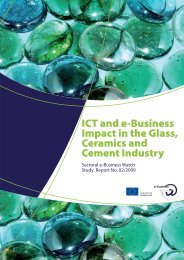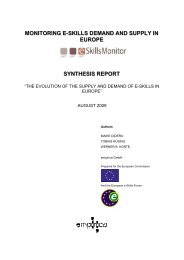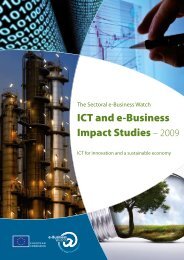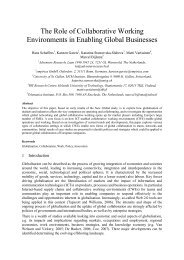ICT and e-business in the tourism industry ICT adoption ... - empirica
ICT and e-business in the tourism industry ICT adoption ... - empirica
ICT and e-business in the tourism industry ICT adoption ... - empirica
Create successful ePaper yourself
Turn your PDF publications into a flip-book with our unique Google optimized e-Paper software.
Tourism<br />
References<br />
Research for this case study was conducted by Matthias R<strong>in</strong>gel, Rambøll Management,<br />
on behalf of e-Bus<strong>in</strong>ess W@tch. Sources <strong>and</strong> references used:<br />
Interview with Nicolas Besse, Web Distribution Director Accor Group, 26 th April 2006<br />
“The Cost of New Distribution Channels”, presentation by Mr Nicolas Besse at <strong>the</strong><br />
ENTER 2006 conference (26–28 January 2006), Accor 2006<br />
e-Bus<strong>in</strong>ess W@tch, case study on Accor Hotels (August 2004), www.e<strong>bus<strong>in</strong>ess</strong>watch.org<br />
‘resources’<br />
“Accor Hotelgruppe setzt auf globalen Internet Distribution Service von Pegasus<br />
Solutions”, article 7 September 2004, www.bz-comm.de/<br />
“La connaissance clients des sites Accor”, article 21 March 2006,<br />
www.relationclient.net<br />
Websites:<br />
• www.accor.com<br />
• www.hotelmarket<strong>in</strong>g.com<br />
4.1.6 Summary of ma<strong>in</strong> po<strong>in</strong>ts <strong>and</strong> conclusions<br />
The IT revolution <strong>and</strong> <strong>the</strong> <strong>in</strong>troduction of e-commerce processes have led to two<br />
conflict<strong>in</strong>g, parallel trends which have a profound impact on <strong>the</strong> role of <strong>in</strong>termediaries <strong>in</strong><br />
<strong>the</strong> <strong>tourism</strong> market: dis-<strong>in</strong>termediation <strong>and</strong> re-<strong>in</strong>termediation. While, on <strong>the</strong> one h<strong>and</strong>, IT<br />
<strong>and</strong> e-commerce represent a challenge <strong>and</strong> a threat to <strong>the</strong> role of <strong>in</strong>termediaries <strong>in</strong> <strong>the</strong><br />
<strong>tourism</strong> value cha<strong>in</strong>, <strong>the</strong>y also provide new opportunities <strong>and</strong> chances for traditional <strong>and</strong><br />
newly emerg<strong>in</strong>g onl<strong>in</strong>e <strong>in</strong>termediaries. The case studies presented <strong>in</strong> this section<br />
exemplify this situation:<br />
The case study on Accor supports to some extent <strong>the</strong> dis-<strong>in</strong>termediation argument: By<br />
<strong>in</strong>troduc<strong>in</strong>g an electronic revenue management system as well as a central reservation<br />
system (CRS) which l<strong>in</strong>ks each <strong>in</strong>dividual hotel with <strong>the</strong> group, Accor has managed to<br />
boost its direct sales via its own hotel network, <strong>the</strong>reby bypass<strong>in</strong>g traditional<br />
<strong>in</strong>termediaries. This allowed Accor to save commission costs which it o<strong>the</strong>rwise would<br />
have had to pay to <strong>in</strong>termediaries if it would not have offered <strong>the</strong>se services itself.<br />
However, Accor also realised that completely circumvent<strong>in</strong>g <strong>the</strong> use of <strong>in</strong>termediaries<br />
would not be an option s<strong>in</strong>ce <strong>the</strong>se <strong>in</strong>termediaries proved to be particularly effective <strong>and</strong><br />
valuable for <strong>the</strong> promotion of hotel rooms <strong>in</strong> <strong>the</strong> low seasons. Therefore, Accor adopted<br />
an anti-cyclic <strong>in</strong>termediary strategy: Instead of pay<strong>in</strong>g an average commission to<br />
<strong>in</strong>termediaries for each hotel room booked, it adopted a system <strong>in</strong> which <strong>in</strong> an <strong>in</strong>dividual<br />
hotel’s high season, when <strong>the</strong> level of occupancy is high – <strong>and</strong> hence <strong>the</strong> need for<br />
<strong>in</strong>termediary services low – <strong>the</strong> commission would be lower; <strong>in</strong> contrast, <strong>in</strong> a hotel’s low<br />
season, when <strong>the</strong> level of occupancy is low – <strong>and</strong> hence <strong>the</strong> need for <strong>in</strong>termediary<br />
services is high – <strong>the</strong> commission for <strong>in</strong>termediary services would also be high. In this<br />
106


